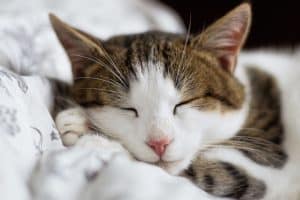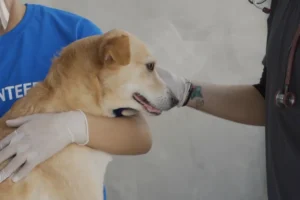Cats can get covid – but why? Let’s find out.
Cats can contract covid from humans
How does covid spread to cats?
Cats can contract COVID-19 from humans through respiratory droplets. When an infected person coughs or sneezes, the virus can land on surfaces that the cat may come into contact with. If the cat then touches its face or food and water bowls contaminated with the virus, it can potentially become infected. Additionally, petting or close contact with an infected individual can also lead to transmission to cats.
It is essential to practice good hygiene around your pets if you are infected with COVID-19. Wash your hands before and after interacting with them, avoid sharing food, and try to maintain a safe distance to reduce the risk of transmission.
Can cats give covid to other cats?
Contrary to popular belief, there have been rare cases where cats have transmitted COVID-19 to other felines. However, the risk is generally low, and most cases of transmission occur from humans to cats.
If you have multiple cats in your household, it is important to monitor their health if one of them tests positive for COVID-19. Keep infected cats isolated from healthy ones, and sanitize their living spaces regularly to prevent the spread of the virus among your pets.
Tip: Provide separate food and water bowls for each cat to minimize any potential spread of the virus between them.
Are kittens more susceptible to catching covid?
Contrary to popular belief, kittens are not necessarily more susceptible to catching covid than adult cats. While age can play a factor in the severity of the illness if a cat does get infected, there is no concrete evidence to suggest that kittens are at a higher risk of contracting the virus than older cats. Just like with humans, the chances of contracting covid in cats are primarily linked to exposure to the virus rather than age.
What are the symptoms of covid in cats?
- Fever: One common symptom of covid in cats is a fever. Keep an eye on your cat’s body temperature and consult a veterinarian if you notice any signs of fever.
- Coughing and sneezing: Just like humans, cats infected with covid may experience respiratory symptoms such as coughing and sneezing. If your cat displays these symptoms, it’s important to seek veterinary care.
- Difficulty breathing: Covid can also cause difficulty breathing in cats. If you notice that your cat is having trouble breathing, it’s crucial to get them medical attention immediately.
- Loss of appetite: A cat infected with covid may show a lack of interest in food. If your cat suddenly loses their appetite, it could be a sign of illness.
- Lethargy: Cats with covid may become lethargic and less active than usual. Monitor your cat’s energy levels and behavior for any changes that could indicate illness.
Keep in mind that these symptoms can vary in severity, and some cats may show no symptoms at all. If you suspect that your cat has covid, it’s essential to contact your veterinarian for guidance on how to proceed. Early detection and treatment are key to managing the illness effectively.
Can cats recover from COVID?
Yes, cats can recover from COVID, just like humans. Most infected felines experience mild symptoms and bounce back with proper care. It’s essential to monitor your cat closely, ensure they stay hydrated, and provide a comfortable environment for rest. If you notice severe symptoms like difficulty breathing or lethargy, contact your veterinarian immediately for guidance on treatment options.
How can I protect my cat from COVID?
- Limit Exposure: Keep your cat indoors to reduce the risk of exposure to the virus.
- Practice Good Hygiene: Wash your hands before and after interacting with your cat, especially if you’ve been around sick individuals.
- Visit the Vet: Regular check-ups and vaccinations can help keep your cat’s immune system strong.
- Disinfect: Clean and disinfect high-touch surfaces in your home regularly to prevent the spread of the virus.
- Quarantine: If you or someone in your household is sick, try to limit contact with your cat until everyone has fully recovered.
- Healthy Diet: Feed your cat a balanced diet to support their immune system and overall health.
By following these tips, you can help protect your beloved feline friend from COVID and other illnesses. Stay vigilant and prioritize your cat’s health and well-being.
Can outdoor cats get covid?
While outdoor cats can potentially get covid, the risk may be lower than for humans. Outdoor cats have more freedom to roam and interact with other animals, increasing their chances of exposure to the virus. It’s essential for pet owners to be cautious and limit their outdoor cat’s contact with unfamiliar animals to reduce the risk of transmission.
Quick Tips to Protect Your Outdoor Cat from Covid:
- Keep your cat indoors during peak transmission times.
- Regularly disinfect your cat’s belongings.
- Limit contact with other animals outside the household.
Fun Fact: Did you know that cats can actually catch covid from humans? This highlights the importance of taking precautions to protect both your feline friends and yourself.
Key Differences between covid in cats and humans
Covid affects cats differently than humans, with some key distinctions to keep in mind. While cats can become infected with the virus, they typically show mild symptoms or may even be asymptomatic. In contrast, humans can experience severe illness and complications from covid.
One crucial difference is that cats are less likely to transmit the virus to humans, making the risk of cross-species transmission relatively low. However, it’s still essential to practice good hygiene and safety measures to protect your furry companions and yourself.
Remember that monitoring your cat’s health and consulting with a veterinarian if you have any concerns are vital steps in ensuring their well-being during this challenging time. Stay informed and prioritize the health of both you and your beloved pets.
Alex, a passionate animal lover, has experience in training and understanding animal behavior. As a proud pet parent to two dogs and three cats, he founded AnimalReport.net to share insights from animal experts and expand his knowledge of the animal kingdom.




